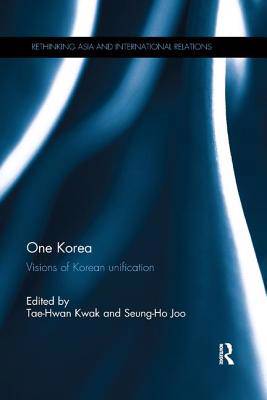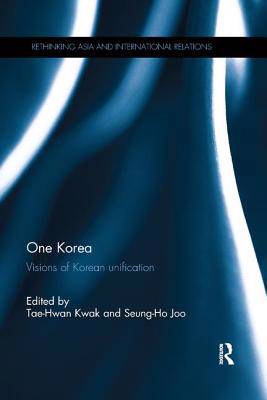
- Afhalen na 1 uur in een winkel met voorraad
- Gratis thuislevering in België vanaf € 30
- Ruim aanbod met 7 miljoen producten
- Afhalen na 1 uur in een winkel met voorraad
- Gratis thuislevering in België vanaf € 30
- Ruim aanbod met 7 miljoen producten
One Korea
Visions of Korean Unification
Omschrijving
On the Korean peninsula, there exist two sovereign states--the Republic of Korea (ROK or South Korea) and the Democratic People's Republic of Korea (DPRK or North Korea)--both of whom hold separate membership at the United Nations. This book discusses the construction of "one Korea" and highlights the potential benefits of unification for the Koreans and the international community. Arguing that Korean unification is intrinsically international in nature, the authors outline how the process and outcome would impact upon the policies of the four major powers--the U.S., China, Russia, and Japan. In addition, the authors highlight the possible far-reaching repercussions of unification on the political and economic dynamics of Northeast Asia. Making a case for the two Koreas and interested powers to plan and orchestrate their acts for sustained peace and gradual unification on the Korean peninsula, this book examines the Korean question and the related issue of peace building in Northeast Asia from a global perspective. It will be of interest to students and scholars researching politics and international relations.
Specificaties
Betrokkenen
- Uitgeverij:
Inhoud
- Aantal bladzijden:
- 222
- Taal:
- Engels
- Reeks:
Eigenschappen
- Productcode (EAN):
- 9781138361355
- Verschijningsdatum:
- 14/08/2018
- Uitvoering:
- Paperback
- Formaat:
- Trade paperback (VS)
- Afmetingen:
- 156 mm x 233 mm
- Gewicht:
- 430 g

Alleen bij Standaard Boekhandel
Beoordelingen
We publiceren alleen reviews die voldoen aan de voorwaarden voor reviews. Bekijk onze voorwaarden voor reviews.










